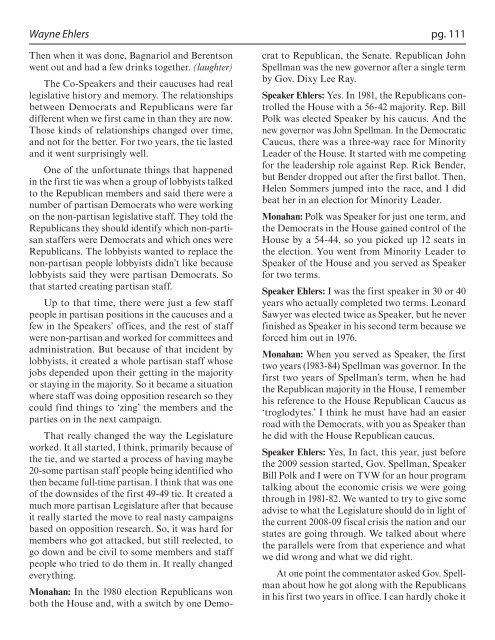Helen Sommers: An Oral History
Helen Sommers: An Oral History
Helen Sommers: An Oral History
You also want an ePaper? Increase the reach of your titles
YUMPU automatically turns print PDFs into web optimized ePapers that Google loves.
Wayne Ehlers<br />
Then when it was done, Bagnariol and Berentson<br />
went out and had a few drinks together. (laughter)<br />
The Co-Speakers and their caucuses had real<br />
legislative history and memory. The relationships<br />
between Democrats and Republicans were far<br />
different when we first came in than they are now.<br />
Those kinds of relationships changed over time,<br />
and not for the better. For two years, the tie lasted<br />
and it went surprisingly well.<br />
One of the unfortunate things that happened<br />
in the first tie was when a group of lobbyists talked<br />
to the Republican members and said there were a<br />
number of partisan Democrats who were working<br />
on the non-partisan legislative staff. They told the<br />
Republicans they should identify which non-partisan<br />
staffers were Democrats and which ones were<br />
Republicans. The lobbyists wanted to replace the<br />
non-partisan people lobbyists didn’t like because<br />
lobbyists said they were partisan Democrats. So<br />
that started creating partisan staff.<br />
Up to that time, there were just a few staff<br />
people in partisan positions in the caucuses and a<br />
few in the Speakers’ offices, and the rest of staff<br />
were non-partisan and worked for committees and<br />
administration. But because of that incident by<br />
lobbyists, it created a whole partisan staff whose<br />
jobs depended upon their getting in the majority<br />
or staying in the majority. So it became a situation<br />
where staff was doing opposition research so they<br />
could find things to ‘zing’ the members and the<br />
parties on in the next campaign.<br />
That really changed the way the Legislature<br />
worked. It all started, I think, primarily because of<br />
the tie, and we started a process of having maybe<br />
20-some partisan staff people being identified who<br />
then became full-time partisan. I think that was one<br />
of the downsides of the first 49-49 tie. It created a<br />
much more partisan Legislature after that because<br />
it really started the move to real nasty campaigns<br />
based on opposition research. So, it was hard for<br />
members who got attacked, but still reelected, to<br />
go down and be civil to some members and staff<br />
people who tried to do them in. It really changed<br />
everything.<br />
Monahan: In the 1980 election Republicans won<br />
both the House and, with a switch by one Demo-<br />
pg. 111<br />
crat to Republican, the Senate. Republican John<br />
Spellman was the new governor after a single term<br />
by Gov. Dixy Lee Ray.<br />
Speaker Ehlers: Yes. In 1981, the Republicans controlled<br />
the House with a 56-42 majority. Rep. Bill<br />
Polk was elected Speaker by his caucus. <strong>An</strong>d the<br />
new governor was John Spellman. In the Democratic<br />
Caucus, there was a three-way race for Minority<br />
Leader of the House. It started with me competing<br />
for the leadership role against Rep. Rick Bender,<br />
but Bender dropped out after the first ballot. Then,<br />
<strong>Helen</strong> <strong>Sommers</strong> jumped into the race, and I did<br />
beat her in an election for Minority Leader.<br />
Monahan: Polk was Speaker for just one term, and<br />
the Democrats in the House gained control of the<br />
House by a 54-44, so you picked up 12 seats in<br />
the election. You went from Minority Leader to<br />
Speaker of the House and you served as Speaker<br />
for two terms.<br />
Speaker Ehlers: I was the first speaker in 30 or 40<br />
years who actually completed two terms. Leonard<br />
Sawyer was elected twice as Speaker, but he never<br />
finished as Speaker in his second term because we<br />
forced him out in 1976.<br />
Monahan: When you served as Speaker, the first<br />
two years (1983-84) Spellman was governor. In the<br />
first two years of Spellman’s term, when he had<br />
the Republican majority in the House, I remember<br />
his reference to the House Republican Caucus as<br />
‘troglodytes.’ I think he must have had an easier<br />
road with the Democrats, with you as Speaker than<br />
he did with the House Republican caucus.<br />
Speaker Ehlers: Yes, In fact, this year, just before<br />
the 2009 session started, Gov. Spellman, Speaker<br />
Bill Polk and I were on TVW for an hour program<br />
talking about the economic crisis we were going<br />
through in 1981-82. We wanted to try to give some<br />
advise to what the Legislature should do in light of<br />
the current 2008-09 fiscal crisis the nation and our<br />
states are going through. We talked about where<br />
the parallels were from that experience and what<br />
we did wrong and what we did right.<br />
At one point the commentator asked Gov. Spellman<br />
about how he got along with the Republicans<br />
in his first two years in office. I can hardly choke it
















